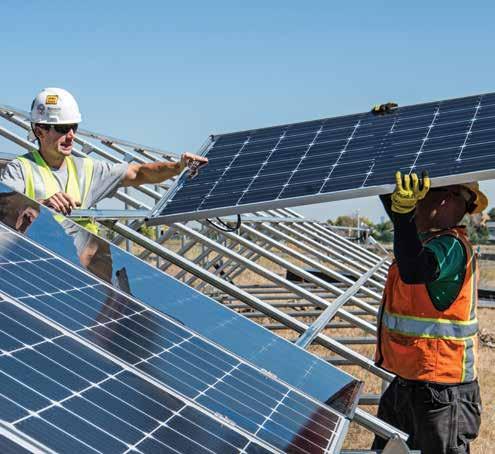
3 minute read
RENEWABLE ENERGY ON THE RISE IN NAMIBIA with PREN
RENEWABLE ENERGY ON THE RISE IN NAMIBIA
Namibia imports around 60 percent of its electricity from neighbouring countries, but has great potential to produce renewable energy. This is why the team from the Promoting Renewable Energies in Namibia project (PREN) are working tirelessly to create awareness around renewable energy.
Alongside a team of his students, Rodney Seibeb from PREN took to the Namibian desert in search of lessons from nature.
“Renewable energy,” says Rodney, “is one of the forms of energy Namibia has been exploring. This so-called ‘clean energy’ has been promoted around the world for years. Finally, Namibia is catching up.”
Talking about some of the myths around renewable energy, he says: “Since it is modern energy, most people think it is a very expensive way of electrifying your house, but over the past years the cost of these panels and components or the solar systems have really gone down.”
He adds that with the work happening in the industry today, that myth will eventually be proven inaccurate.
The PREN project is a three-year project that is being implemented by the Hanns Seidel Foundation and the Desert Research Foundation of Namibia (DRFN). It started in 2017 with the main aim of promoting the use of renewable energy and energy efficiency in Namibia.
“We have the promotion of renewable energies at rural schools. We have identified six rural schools that need to be electrified and we have so far electrified four of those. We’ve given training to the management of the schools and handed over the systems to them to ensure sustainability of the systems,” Seibeb says of the grassroots implementations.
WITH PREN
One of Seibeb’s students, Peter Hafiku agrees: “I think saving electricity and water may look basic, but they can actually save you a lot of money and also, through the process, energy. Yes, there are things like leaking taps – as soon as you find a leaking tap in your house, you must fix it. Save electricity by switching off the main switch, because most electrical appliances use energy when they are plugged in, even if you are not using any of them.”
FIND THE HANNS SEIDEL FOUNDATION WEBSITE ON WWW.NAMIBIA.HSS.DE AND THE DESERT RESEARCH FOUNDATION OF NAMIBIA WEBSITE ON WWW.DRFN.ORG.NA
PUTTING THE “GOOD” INTO BEING A “GOOD SPORT”
The slogan for Africa Personnel Services proudly declares Think staff, think APS – and although it refers to the personnel services they offer their clients, when it comes to their own people, this sentiment holds true of APS’s company culture too.
Six years ago, fresh out of school, Lyzanne Januarie started working as a receptionist at APS. She made a distinct impression when she ran down a thief who had snatched a computer from the office, and managed to reclaim the stolen item. Her demonstration of loyalty earned her the trust and support of the company, and she quickly worked her way up the ranks to become head marketer in the marketing department.
When Lyzanne decided to embark on a complete lifestyle reinvention two years ago, she signed up for, and won, a fitness and body-transformation challenge – and discovered a passion for health and fitness. APS encouraged her to pursue her new sport and assisted her in attending international competitions. She did them proud, walking away with gold and silver medals on several occasions.
Lyzanne’s transformation has inspired many of her colleagues to make positive lifestyle changes. When they have consulted with her, she’s been happy to help – and motivating others has become a primary goal, which she continues to pursue in her life.
APS has a track record of supporting sports development in Namibia. Since APS and other businesses got involved with cricket development in Namibia, it has evolved from being a peripheral sport to becoming an internationally competitive force, which does Namibia proud.
The culture of development and support is one fostered by APS’s leaders, especially Managing Director Robert de Villiers: “As a business. I believe that you have a responsibility towards the community. You can’t just take; you also have to put back. And it’s not only about money; it goes beyond that. Lyzanne inspired many of the people in our office to change to a healthier lifestyle.”
From putting up shading nets in front of a clinic in Katatura, to provided shade for long queues of people waiting to be helped, to developing school-leavers into competent, confident and skilled employees, APS understands that for a business to claim that it puts staff and people first, charity must begin at home.










